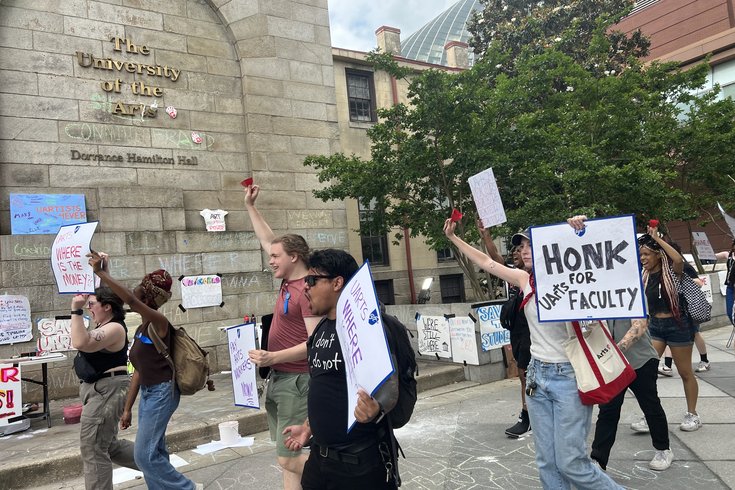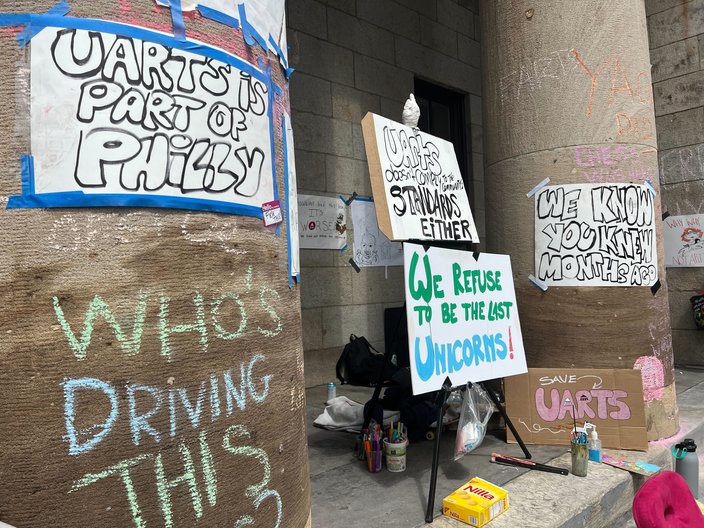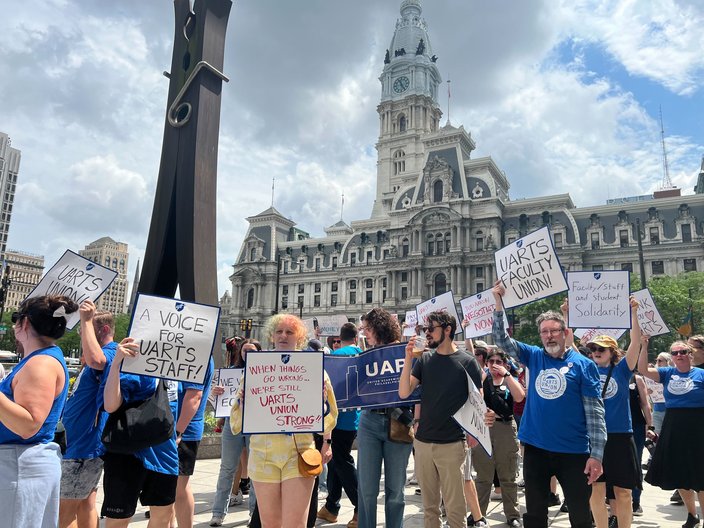
June 05, 2024
 Chris Compendio/PhillyVoice
Chris Compendio/PhillyVoice
Protesters in support of University of the Arts students and faculty marched Wednesday from Hamilton Hall to 15th and Market streets, where the university's board chair Judson Aaron has a law office.
As the fallout from the abrupt closure of the University of the Arts continues, students, faculty and staff members marched to express their discontent with the administration.
A coalition of demonstrators led by United Academics of Philadelphia (UAP), the local chapter of the American Federations of Teachers union (AFT), marched on Broad Street on Wednesday morning from Hamilton Hall to 15th and Market streets, where the university's board chair Judson Aaron has a law office.
On Friday, the university announced it was closing at the end of this week, saying it's been in a "fragile financial state" for years. In the days since, there have been few answers from administration about what will happen next.
The purpose of Wednesday's march stems from the cancelation of a bargaining session between the faculty union and the administration and the resignation of President Kerry Walk. Rallying demonstrators demanded negotiations to address how the closure will affect faculty and staff.
Chants of "union power!" were amplified by drivers on Broad Street honking their horns in support.
After Sarah MacLeod finished her sophomore year, the fine arts major with a double minor in sculpture and art history was plotting her future, with the intention of studying abroad.
"I was planning on helping my dance major roommates with their senior thesis," MacLeod said sitting on the steps of Hamilton Hall. "I was planning my thesis with all of my friends. I still had two years, but we were so excited for all of the plans for the future."
When the news broke of UArts closing, MacLeod found out from her roommate's Instagram story. The lack of communication from administration left students scrambling for answers.
"Phones were blowing up," MacLeod said. "It was frantic. It was panicked. It was sad."
As the situation unfolded, other Philadelphia universities made efforts to welcome UArts students into their own institutions.
"It's really incredible what (other universities have) been able to do, considering our school has done nothing," MacLeod said. "They've been doing more than our own administration."
While MacLeod was appreciative of the support, she also said options could be limiting for some displaced students.
"Not all of us want to go to a school with thousands of people," she said. "We chose this school because it's small and intimate. And there's not another school like this anywhere else, which is unfortunate."
For Kaitlyn Oliveri, who was preparing for her senior year in the School of Music, the shuttering of UArts has a major impact to the city and beyond.
"Sure, there are still the Kimmel Center and theaters," Oliveri said. "But there's no direct funnel from education in the heart of the city to these performance centers in the future.
"... This is a bigger issue that doesn't just involve Philadelphia. It involves how our country treats the arts. I feel like a lot of the times, it's deemed as unimportant or not as significant as other majors, when really, art is the key to our voice in this country, and it unifies us."
Signs are displayed outside Hamilton Hall at the University of the Arts, where students and faculty rallied on Wednesday to demand answers about the school's pending closure and a meeting with the administration.
Two longtime faculty members at the UArts School of Music, each with more than two decades of teaching experience, described the personal upheaval they've been facing as they sort out their futures. Together with their colleagues and students, they aren't ready to give up on a collective path forward for the UArts community.
"Initially, the pain of the impact and the lack of warning was sort of this shock and almost grief, almost as if losing a loved one," said Micah Jones, a program director and former dean at the School of Music. "But as we've moved forward, students have really rallied. I'm proud of them stepping up and challenging the powers that be to continue what they've come here to do."
Jones called it a "surreal" experience cleaning out his office. He has been a UArts teacher for 23 years, and he said his daughter was planning to attend the university this fall to study animation. He was counting on the benefit of tuition remission that comes with faculty status.
"Now that's also been taken away," he said.
Jones' colleague, pianist and composer Don Glanden, said the behavior of UArts leadership has been "a disgrace" and shows little concern or respect for everyone who has upheld the university's reputation.
"There's no real academic reason for this to have happened," Glanden said. "This is purely (the school's) interpretation of their financial situation and whatever bad decisions have been made along the way. ... We're convinced that it didn't need to happen."
Glanden joined the UArts faculty in 1996. Many of his students and others in the program have gone on to have renowned careers in the music industry. He believes the university failed to lean on its extended network to address its immediate financial emergency, he said.
"We feel that we could have made a significant difference collectively because of all the tentacles we have that go out through the arts community," Glanden said.
Faculty members still haven't gotten clarity from the university about what to expect in the coming weeks and months. On Monday, an information session that had been planned for faculty was canceled minutes before it was supposed to take place. Then came Walk's resignation, further muddying the future.
"We don't know what our severance could be. We don't know what our last day is," Jones said. "There's just no inclination of what's next other than this June 7 closure. There's nothing concrete about any of this. Nothing has been put in writing. It falls on the board at this point. And they've been radio silent."
The faculty is demanding a meeting with Aaron — an alumnus of the School of Music — to discuss options and negotiate with their union under the umbrella of United Academics Philly. Jones and Glanden are not part of the union, which represents about 700 people at the university, due to their roles as UArts program directors. But they are working alongside members and aligned on the need for direct talks with Aaron.
There has been preliminary discussion about a possible merger with Temple University, whose president called the UArts closure "devastating" but did not go into detail about the school's potential plans.
"Over the last several days, we have spoken with UArts representatives to explore all options and possible solutions that might help preserve the arts and the rich legacy of this 150-year-old institution," said a letter signed by Temple President Richard Englert and senior vice president and provost Gregory Mandel.
Glanden, who taught at Temple for four years before moving to UArts, said the idea is worth entertaining. But the absence of any details or communication about it leaves too much to the imagination.
"These proposals are new, so we don't know what they entail," he said. "We don't know whether we would continue to have any autonomy, or the way governance would work."
University of the Arts faculty and staff gathered outside City Hall on Wednesday.
Whether or not UArts can be salvaged in some form, the school's faculty and staff are anxiously confronting their own personal crises and have been organizing around the clock to protect themselves.
"As the contract makes pretty clear, (the school is) obligated to meet and negotiate with us in the event of layoffs," said Rick Rien, a union member and adjunct faculty member, who has taught sound engineering at the School of Music since 2021. "It's a sudden loss of a bunch of prospective income that I was looking forward to — a significant chunk of money for teaching summer classes. I'm looking to fill that void."
Late Wednesday afternoon, the faculty union and other UArts allies filed a class action lawsuit against the university for its failure to provide the federally required 60 days’ written notice for a mass layoff or closure. The lawsuit will seek damages for faculty and staff members affected by the sudden closure.
The faculty union also filed an Unfair Labor Practice charge with the National Labor Relations Board over the administration’s lack of engagement with the impact bargaining process, and it notified Temple Board of Trustees Chair Mitchell Morgan that it intends to enforce its collective bargaining agreement in the event of a sale, transfer or merger of UArts with Temple.
“Any conversations around a potential merger must include all those impacted, and any solution to this crisis must be one in which students, faculty, staff, and the Philadelphia arts community can thrive together,” the faculty union wrote on Instagram.
Adjunct faculty like Rien are reappointed each semester, meaning they typically receive letters notifying them that the university plans to bring them back. Because of the unusual nature of the UArts closure, some union members fear the university is looking for legal routes to avoid fulfilling the obligations required in more straightforward layoffs.
Glanden lamented that Aaron's "unresponsive stonewalling posture" is wasting precious time that could be used to extend the university's deadline for appealing the withdrawal of accreditation or enable stakeholders to investigate avenues to save the university.
"We want to be reinstated," Glanden said. "There are so many irregularities — and, at least, possible illegalities — that it's just so unusual. People who are involved in higher education at administrative levels for a long time are saying that this is just not the way it's done. They kind of broke every rule."
 Chris Compendio/PhillyVoice
Chris Compendio/PhillyVoice Chris Compendio/PhillyVoice
Chris Compendio/PhillyVoice